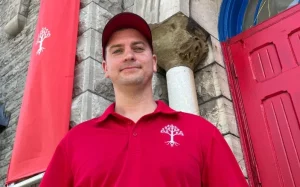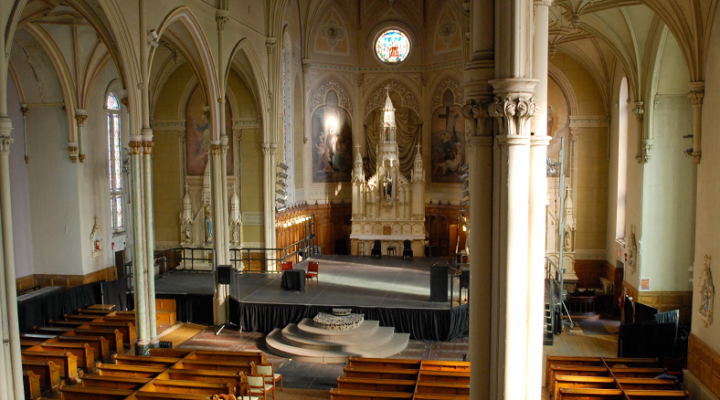Until late September, William Komer and his United People of Canada fringe grouping (known as TUPOC) vowed not to vacate St. Brigid, a historic deconsecrated church in Canada’s capital. Residents fumed that the type of crowds Komer’s group attracted hints at Canada’s Christian Right, which is said to have embedded itself in the infamous “Freedom Convoy” truckers siege in February.
St. Brigid is a historic Roman Catholic temple located in the downtown part of Ottawa, Canada’s capital, and has been on the market for $6 million CA (about $4.3 million U.S.). The church was constructed in the 1870s as a tribute to the shrinking number of Irish Canadians in the city at the time.
Now, the private investors owning St. Brigid obtained a judge’s order to evict Komer and TUPOC over what they say are missed terms to buy the church. Until September, Komer and TUPOC publicly vowed to arrest a bailiff who would approach the church building to enforce the judge’s order, saying TUPOC’s bankable checks have been refused by the landlord.

William Komer outside St. Brigid’s Church. (CBC)
At the heart of the standoff: Some residents in Canada’s capital accuse Komer and TUPOC of being aligned with the Christian Right, of being associated with the controversial truckers’ convoy, of water-gun intimidation of residents who confront TUPOC, and of spreading conspiracy theories.
“It’s all lies,” Komer told Baptist News Global in a telephone interview. He flatly rejected accusations of being alligned with Canada’s Christian Right and the “Freedom Convoy’.” He further claimed that his TUPOC fringe group is open to people of all beliefs and simply wanted to turn St. Brigid, the historic former parish, into an “embassy” where “people can gather to share ideas.”
The Christian Right is small in Canada compared to its gigantic influence in the U.S., but it already was involved in some of the same movements that coalesced in the convoy, according to Christine Mitchell, professor of the Hebrew Bible at Knox College at the University of Toronto.
In August, Mitchell warned that the Christian nationalist truckers’ “divinely-mandated mission is the overthrow of the Canadian government,” and that they likely believe “Parliament is the temple that will be destroyed unless people turn from their sin.”
“Some Christian groups or communities were heavily involved in protesting vaccine mandates. The Christian groups involved in these forms of protest were all from what I would term the Christian Right,” Mitchell said in an interview.
“The Christian Right is small in Canada, but it was already involved in some of the same movements that coalesced in the so-called trucker convoy.”
However, unlike the U.S. where the Christian Right is a big, visible force in public affairs, part of the problem in Canada is that there have been a few remarks by journalists who have interviewed participants commenting that a particular interviewee credited their belief in God (the Christian God) as a factor in their decision to participate in the convoy, Mitchell said. “Unlike in the U.S., in Canadian society religion is not something openly discussed in public, (so) journalists are not often equipped to understand how faith plays into someone’s decision making.”
Skepticism about the Christian Right is high in Canada in part because of the truckers’ blockade over COVID. Observers noted many evangelical Christians and pastors were key participants in the Ottawa convoy in February, with many promoting extreme Christian nationalist rhetoric and Canadian nationalism.
Nationalist truckers and their Christian Right supporters may not yet be a security threat to Canada’s public safety and liberal constitutional order because they’re not yet that organized or mobilized in terms of using February’s chaos that paralyzed Canada’s capital as a “test run,” Mitchell said. “Whether they can expand their reach is something to watch.”
Related article:
Five misconceptions and four truths about Canada’s ‘Freedom Convoy’ | Analysis by Spencer Boersma


